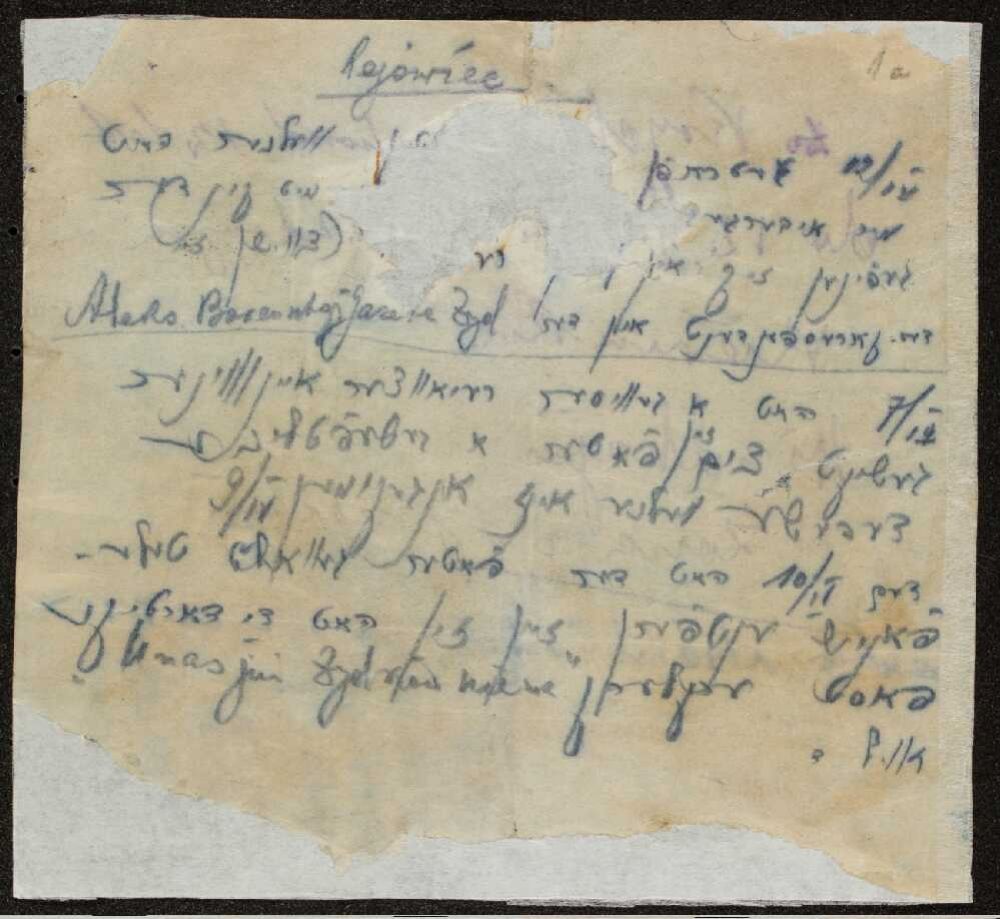- News
- Events
- Oneg Shabbat
- Collections
- Research
- Exhibitions
- Education
- Publishing Department
- Genealogy
- About the Institute
- Bookstore


Jechiel Górny, The daily records (1942) / The Ringelblum Archive
Jechiel Górny was born in 1908. We don’t have much information about his life before the war. In 1939, he moved from Kalisz to Warsaw and moved in with his wife into a house at 69 Miła street. He was Ringelblum’s colleague from the Poalej Syjon-Lewica party, which probably led him to Oneg Shabbat.
Górny’s responsibilities in Oneg Shabbat were related to documents and registers, conducting interviews and writing. He was also copying documents for the Archive, usually in three copies through tracing paper. He copied by hand such documents as the extensive report of the Labour Battalion for 1940, materials about labour camps, a survey conducted among children regarding the changes caused by the war, Małowist’s study on education in the Warsaw Ghetto, Mordechaj Wasser’s diary, Dora Sztatman’s personal account and others.
Górny was also cataloguing materials from the Archive. He wrote the „Index of prints” – 707 various documents whose stories we don’t know. He also made an index of the „Kalisz letters”.
![górny_2_ARG-I-414_8.jpg [93.74 KB]](https://www.jhi.pl/storage/image/core_files/2022/3/23/0527fb7da22bcc3352b5ebbd2fa5f0ea/jpg/jhi/preview/górny_2_ARG-I-414_8.jpg)
Górny wrote for the Archive his own works – one about the quarantine in the Warsaw Ghetto based on an interview with a man resettled from Jeziorna, and (probably) Notes on the history of entering and leaving the Jewish Ghetto in Warsaw, regarding smuggling and escaping to the „aryan side”. In general, the Archive contains more than 70 documents in Polish and in Yiddish written by Górny. Many of them were signed with the name „Jechiel“.
In the ghetto, he was writing a diary (preserved notes are dated from late May 1942 until the end on January 1943) which he had been continuing also during the Great Deportation. He is also an author of one of the forst descriptions of the resistance in January 1943 – his notes, straightforward and concise, provide a detailed description of the events.
28 I 1942 / Action no. 2
10 days have passed since that unexpected Monday, 18 January 1943. Ten days full of nightmares, terror and fear of what tomorrow may bring (…) There were shots fired at Niska street. Three young people were shooting from a small wooden house towards a column of marching Germans. The shots sounded like machine gun. Four Germans were killed. Only after setting the house on fire, the Germans could move on. The Jewish heroes have died in the fire in the house. [1]
He was concisely recording current events in the ghetto, noting down the number of murdered people, circumstances of death of particular persons; he was trying to identify the names of victims. The descriptions are free of emotion, aside from excerpts dedicated to the Jewish police. [2] He was asking: Can the actions of the Jewish police during the deportation be justified? (…) The great word: I accuse – contains the answer to their deeds. [3]
Górny kept on writing avan after the Germans took away his wife and child on 7 August 1942. He believed in the necessity of armed resistance against the Germans. During the Ghetto Uprising, he fought under nom de guerre „Jur” in the Poalej Syjon-Lewica’s military unit led by Hersz Berliński.
He was killed on 10 May 1943, together with a group of insurgents trying to escape the burning ghetto through the sewers.
Written by: Anna Majchrowska
Translated by: Olga Drenda
Footnotes:
[1] The Ringelblum Archive, Dzienniki z getta warszawskiego, vol. 23, ed. Katarzyna Person, Zofia Trębacz, Michał Trębacz, Wyd. Uniwersytetu Warszawskiego, Warsaw 2015, p. 343-344.
[2] Samuel Kassow, Who will write our history?, Wyd. ŻIH, Warsaw 2017, p. 318.
[3] The Ringelblum Archive, Dzienniki z getta warszawskiego, op. cit., p. 324.
Bibliography:
Samuel D. Kassow, Who will write our history?, translated by Grażyna Waluga, Olga Zienkiewicz, Wyd. ŻIH, Warsaw 2017.
The Ringelblum Archive, Dzienniki z getta warszawskiego, vol. 23, ed. Katarzyna Person, Zofia Trębacz, Michał Trębacz, Wyd. Uniwersytetu Warszawskiego, Warsaw 2015.